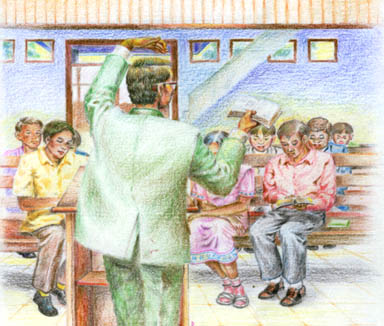RELIGIOUS VIRTUE GROUP
Because I value my relationship with God, I choose to know His character and respond to Him in my worship and life.

RELIGIOUS VIRTUE GROUP Because I value my relationship with God, I choose to know His character and respond to Him in my worship and life. |
|
| How To Be Like Jesus Witness God gives me a part in His saving work. When He blesses my life, I want to tell others what He has done for me. This strengthens their faith and mine. |
|
I choose
to witness. |
Witness means: telling others: how the
Lord has blessed my life, how He has changed my life, how I am happier
with Jesus
|
|
“True Christians will have opportunities for witness.”
MYP 370
|
“A Touch felt ‘round the world”,
Book One, The Children’s Hour by Arthur S. Maxwell, pg.
63.
|
|
Biology: As oxygen keeps the flame alive
so witnessing keeps alive our love of Jesus. English: As publishers give their message, we give God’s message. Health: Exercise gives strength to muscles, witnessing strengthens faith. Physics: The ability of the land and water to absorb and release the sun’s heat affects the weather, so our ability to absorb God’s Word and share it affects the climate of spreading the gospel. Science: We work to reduce pollution so we must work to reduce sin in the world. |
Great Stories for Kids, by Jerry D. Thomas, PPPA,
1999
The Children’s Hour, Arthur S. Maxwell, R&H, 1945
Treasury of Devotional Aids for Home and School by the Department of
Education of the General Conference of SDA, 1951
Sure as the Dawn by Mansell and Mansell, R&H, 1993
A Seventh-day Adventist Statement on Religious Liberty, Evangelism,
and Proselytism
Seventh-day Adventists believe that freedom of religion is a basic human right.
As Christians, they are persuaded that the dissemination of religion is not
only a right, but a joyful responsibility based on a
divine mandate to witness.
God has called Christians to evangelism—the proclamation of the good news
of salvation in Christ (Matt 28:19, 20). This is
central to Christian life and witness. Thus Christianity is missionary by its
very nature.
In affirming global mission and evangelization, Adventists are motivated by
willing obedience to Christ’s commission and by
a sincere desire that every human being be saved and inherit eternal life. They
are also motivated by a sense of urgency in expectation of the imminence of
Christ’s return. In endeavoring to fulfill the gospel commission, Seventh-day
Adventists are thus witnessing, preaching, and serving today in more than 200
countries.
In the context of the dissemination of religion, the issue of “proselytism”
has arisen because the term
“proselytism” is defined in a number of ways and increasingly is
being given a pejorative connotation, associated with unethical means of persuasion,
including force. Seventh-day Adventists unequivocally condemn the use of such
methods. They believe that faith and religion are best disseminated when convictions
are manifested and taught with humility and respect, and the witness of one’s
life is in harmony with the message announced, evoking a free and joyous acceptance
by those being evangelized.
Evangelistic and missionary activity needs to respect the dignity of all human
beings. Individuals need to be truthful and transparent when dealing with other
religious groups. Terminology should be used which avoids offending other religious
communities. Statements which are false or ridicule other religions should not
be made.
Conversion is an experience of the Spirit, and should therefore in no way be
connected to offering and receiving material inducements. While the right to
engage in humanitarian activities must be fully recognized, such action must
never be linked to evangelism in a way that exploits vulnerable people by offering
financial and material incentives to entice them to change religion.
Seventh-day Adventists are committed to serving their fellow men by preaching
the everlasting gospel to every nation, and kindred, and tongue, and people
(Rev 14:6).
This statement was voted by the General Conference of Seventh-day
Adventists Administrative Committee (ADCOM), for release at the time
of the General Conference Session in Toronto, Canada, June 29-July 9, 2000.
Primary: Middle: High school:
|